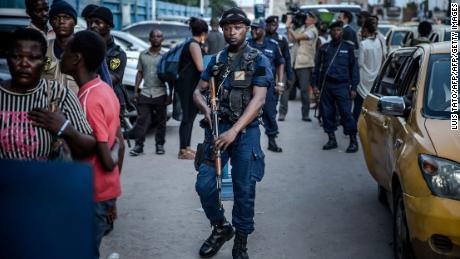Protests erupt in Congo over presidential election delays

Police fired tear gas to disperse dozens of protesters who blocked roads and burned tires in Beni, one of three cities where elections have been delayed because of terrorism and an ongoing Ebola outbreak.Voters in the cities of Beni, Butembo and Yumbi will not be able to cast their ballots until March, the Independent National Election Commission (CENI) said Wednesday, prompting street protests a day after.Anti-riot policemen were deployed in response to street protests in Goma and Butembo, two cities surrounding Beni, on Thursday morning as angry demonstrators, mainly supporters of opposition parties, took to the streets to protest their exclusion from Sunday's polls. Protesters also barricaded major roads by using stones to block vehicles.Supporters of opposition candidate Martin Fayulu, a strong contender in the presidential race, also marched to CENI headquarters in the capital city of Kinshasa on Thursday.Fayulu had earlier condemned the electoral commission's decision in a post on Twitter, calling it "another strategy to turn the truth out of the ballot box." But a spokesman for the electoral body said Wednesday at a news conference in Kinshasa that the decision to delay voting in those areas was "legal."Congo's long-awaited election, which has repeatedly been postponed since 2016, was slated for Sunday. The electoral commission last Thursday announced a decision to delay voting for a week to December 30, sparking protests in the capital. Sunday's vote to pick a successor to President Joseph Kabila follows a violent campaign season amid a tense backdrop of conflict between militant groups and government forces.A massive fire engulfed a warehouse housing electoral materials in Kinshasa earlier this month, destroying thousands of voting machines — around 80% of the city's stock.The Central African nation also is in the throes of an Ebola outbreak, said to be the second-deadliest in history.
Sunday's vote to pick a successor to President Joseph Kabila follows a violent campaign season amid a tense backdrop of conflict between militant groups and government forces.A massive fire engulfed a warehouse housing electoral materials in Kinshasa earlier this month, destroying thousands of voting machines — around 80% of the city's stock.The Central African nation also is in the throes of an Ebola outbreak, said to be the second-deadliest in history.
Journalist Patrick Felix Abely reported from Goma and CNN's Bukola Adebayo wrote from Lagos, Nigeria.
Original Article
[contf] [contfnew] 
CNN
[contfnewc] [contfnewc]



